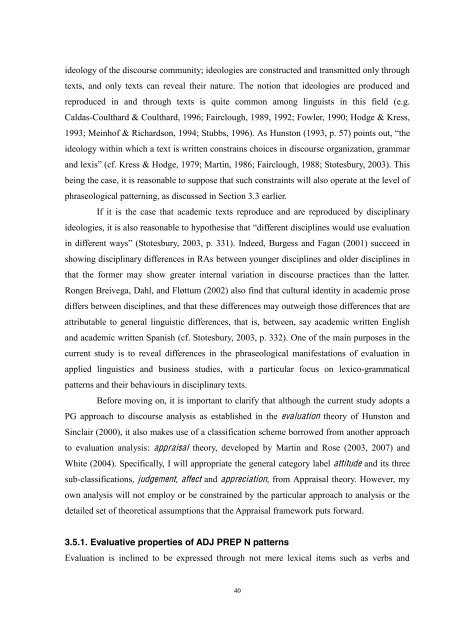Evaluative Meanings and Disciplinary Values - eTheses Repository ...
Evaluative Meanings and Disciplinary Values - eTheses Repository ...
Evaluative Meanings and Disciplinary Values - eTheses Repository ...
Create successful ePaper yourself
Turn your PDF publications into a flip-book with our unique Google optimized e-Paper software.
ideology of the discourse community; ideologies are constructed <strong>and</strong> transmitted only through<br />
texts, <strong>and</strong> only texts can reveal their nature. The notion that ideologies are produced <strong>and</strong><br />
reproduced in <strong>and</strong> through texts is quite common among linguists in this field (e.g.<br />
Caldas-Coulthard & Coulthard, 1996; Fairclough, 1989, 1992; Fowler, 1990; Hodge & Kress,<br />
1993; Meinhof & Richardson, 1994; Stubbs, 1996). As Hunston (1993, p. 57) points out, the<br />
ideology within which a text is written constrains choices in discourse organization, grammar<br />
<strong>and</strong> lexis (cf. Kress & Hodge, 1979; Martin, 1986; Fairclough, 1988; Stotesbury, 2003). This<br />
being the case, it is reasonable to suppose that such constraints will also operate at the level of<br />
phraseological patterning, as discussed in Section 3.3 earlier.<br />
If it is the case that academic texts reproduce <strong>and</strong> are reproduced by disciplinary<br />
ideologies, it is also reasonable to hypothesise that different disciplines would use evaluation<br />
in different ways (Stotesbury, 2003, p. 331). Indeed, Burgess <strong>and</strong> Fagan (2001) succeed in<br />
showing disciplinary differences in RAs between younger disciplines <strong>and</strong> older disciplines in<br />
that the former may show greater internal variation in discourse practices than the latter.<br />
Rongen Breivega, Dahl, <strong>and</strong> Fløttum (2002) also find that cultural identity in academic prose<br />
differs between disciplines, <strong>and</strong> that these differences may outweigh those differences that are<br />
attributable to general linguistic differences, that is, between, say academic written English<br />
<strong>and</strong> academic written Spanish (cf. Stotesbury, 2003, p. 332). One of the main purposes in the<br />
current study is to reveal differences in the phraseological manifestations of evaluation in<br />
applied linguistics <strong>and</strong> business studies, with a particular focus on lexico-grammatical<br />
patterns <strong>and</strong> their behaviours in disciplinary texts.<br />
Before moving on, it is important to clarify that although the current study adopts a<br />
PG approach to discourse analysis as established in the evaluation theory of Hunston <strong>and</strong><br />
Sinclair (2000), it also makes use of a classification scheme borrowed from another approach<br />
to evaluation analysis: appraisal theory, developed by Martin <strong>and</strong> Rose (2003, 2007) <strong>and</strong><br />
White (2004). Specifically, I will appropriate the general category label attitude <strong>and</strong> its three<br />
sub-classifications, judgement, affect <strong>and</strong> appreciation, from Appraisal theory. However, my<br />
own analysis will not employ or be constrained by the particular approach to analysis or the<br />
detailed set of theoretical assumptions that the Appraisal framework puts forward.<br />
3.5.1. <strong>Evaluative</strong> properties of ADJ PREP N patterns<br />
Evaluation is inclined to be expressed through not mere lexical items such as verbs <strong>and</strong><br />
40
















